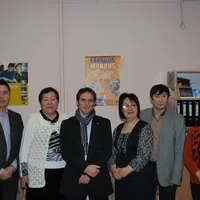CIBELES

The Joint Project under the TEMPUS IV ETF-JP-511172-2010“The curriculum based on the principles of Bologna education leading of environmental education system” (СIBELES)Agreement
Registration number - № 511172 – TEMPUS –1- 2010 –1- DE –TEMPUS- JPCR
Project code-ETF-JP-511172-2010
Grant coordinator: Georg-August-Universitat Gottingen (Gottingen, Germany).
Grant applicant: Georg-August-Universitat Gottingen (Gottingen, Germany).
The project TEMPUS 2010 CIBELES aims to improve higher education in environmental studies within the three specialisations by applying the Bologna Process at all three levels: Bachelor's - Master's - Doctorate. This project promotes cooperation between EU and Central Asian countries in the field of environmental research and the training of managers and specialists in Central Asia to improve environmental protection.
The project has the following objectives:
- To fully implement the objectives of the Bologna Process in environmental studies in at least three countries of Central Asia and Georgia, applying the full Bologna Information Package for countries such as Uzbekistan and Turkmenistan;
- Update the curricula of the three undergraduate specialties (forestry, industrial safety, water and soil ecology);
- Create a master’s degree in environmental protection and quality management; Create 21 schools for doctoral studies (PhD) in the above-mentioned specialties in Central Asia and Georgia;
- Improve the skills of 120 teachers;
- Prepare 480 bachelors and 150 masters in the pilot project during the first year of implementation;
- Improve the ability of students to find work;
- Prepare the ground for the introduction of two master’s and doctoral degrees between EU and Central Asian partners in environmental research;
- Prepare 5 ISO 14000 accreditation centres;
The TEMPUS 2010 CIBELES programme is aimed at:
- reforming and improving higher education in partner countries;
- provision of higher education opportunities in partner countries;
- improve links between higher education institutions and research institutes in both partner countries and EU countries;
- improvement of academic courses using the European Credit Transfer System (ECTS), the three-cycle training system and degree recognition in partner countries.
Grant coordinator:: Georg-August-Universitat Gottingen (Gottingen, Germany).
Grant Applicant: Georg-August-Universitat Gottingen (Gottingen, Germany).
Partners: 23 organizations from Germany, Belgium, Poland, Italy, Spain, Bulgaria, Georgia, Uzbekistan, Tajikistan, Kyrgyzstan, Turkmenistan and Kazakhstan.
